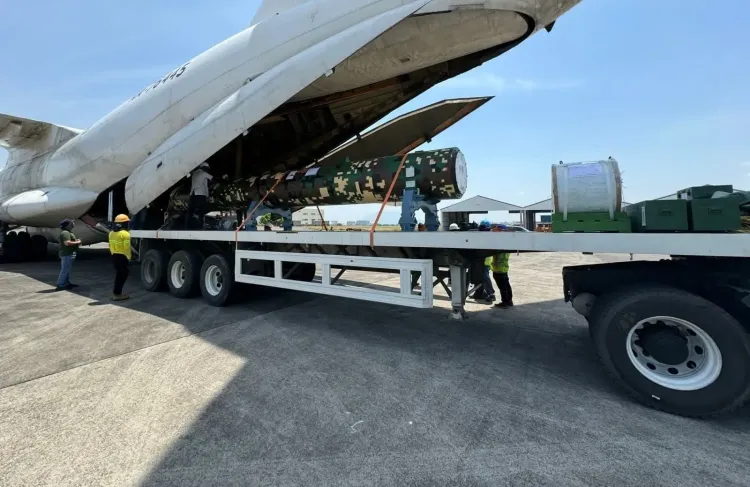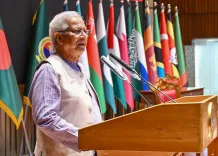India Sends Second Batch of BrahMos Missiles to the Philippines, Enhancing Defence Exports

Synopsis
Key Takeaways
- Second batch of BrahMos missiles sent to the Philippines.
- Three missile batteries with a range of 290 km.
- India's defence production increased significantly since 2014.
- Focus on reducing import dependence via 'Make in India'.
- India's advanced capabilities in missile technology and defence.
New Delhi, April 21 (NationPress) In a major advancement for India’s defence exports, the second batch of batteries of the BrahMos supersonic cruise missile system has been sent to the Philippines.
The initial battery was dispatched in April 2024 aboard an IAF aircraft, with assistance from civil aviation agencies.
The long-distance flight, carrying this heavy cargo, was a continuous six-hour journey before reaching the western regions of the Philippines, as reported by multiple sources.
The agreement with the Philippines was made public in January 2022 for the provision of the BrahMos supersonic cruise missile.
The Philippines will receive three batteries of this missile system, which boasts a range of 290 kilometres and a velocity of 2.8 Mach (approximately 3,400 km/h, three times the speed of sound). The BrahMos missile can be launched from submarines, ships, aircraft, or land.
India's objective is to manufacture defence equipment worth Rs 3 lakh crore by 2029, as per Union Defence Minister Rajnath Singh.
Defence production in India has surged from Rs 40,000 crore in 2014 to over Rs 1.27 lakh crore.
“This year, defence production is expected to exceed Rs 1.60 lakh crore, with a target to produce defence equipment worth Rs 3 lakh crore by 2029,” the minister stated.
The country aims to diminish its reliance on imports while establishing a defence industrial complex that will not only cater to India’s requirements but also enhance the prospects of defence exports.
The ‘Make in India’ initiative is not just fortifying the nation's defence production but also contributing to a resilient and adaptable global defence supply chain.
While India's defence manufacturing capabilities focus on national security and strategic independence, they also protect manufacturing from global supply disruptions.
India now stands alongside developed nations in critical sectors such as missile technology (Agni, BrahMos), submarines (INS Arihant), and aircraft carriers (INS Vikrant).










